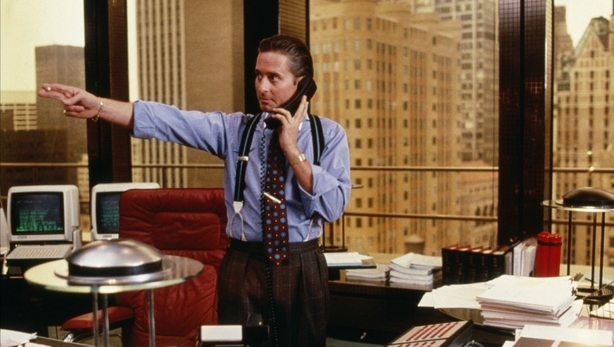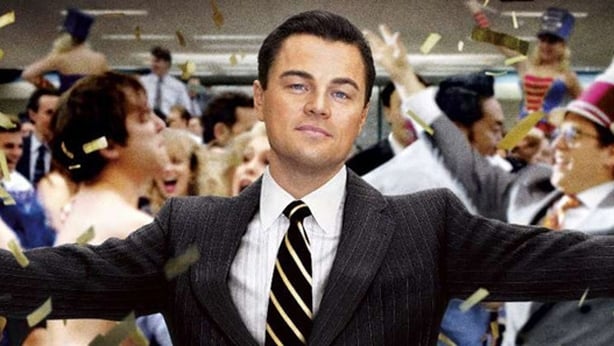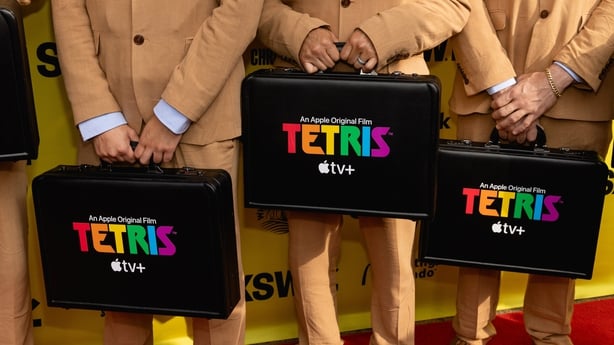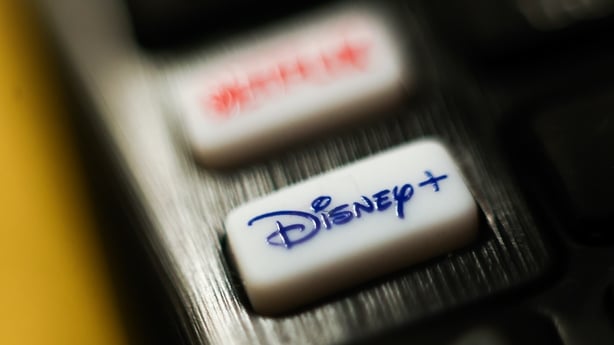Hollywood's interest in the business world goes all the way back to the early days of the 'talkies’.
After all, what’s still considered by many to the be greatest film ever made – Citizen Kane – is essentially a business film.
While fictional, it is thought to be heavily inspired by the real life of William Randolf Hearst. Either way, it’s still centred around the rise and demise of an entrepreneur.
And there have been other classic business films in most decades since – from Glengarry Glen Ross, to Wall Street, to The Social Network.
A lot of people might be bored by real business stories – so why are we so interested in films about businesses and business people
We need your consent to load this rte-player contentWe use rte-player to manage extra content that can set cookies on your device and collect data about your activity. Please review their details and accept them to load the content.Manage Preferences
A good business story tends to have money, power and influence at its heart – and they’re things that people have always been interested in.
But, of course, just like Rocky isn’t just a story about boxing, business films aren’t just about the business or entrepreneurs in question… that’s usually just the ‘in’ to tell a deeper human or societal story.
And the business world is full of stories that reflect bigger, universal themes – or that tell us something about the human condition.
Citizen Kane isn’t actually about newspapers – it’s about obsession, love and loss.
Wall Street isn’t about stocks and shares – it’s about greed and temptation.
And the business world has plenty of underdogs or rags-to-riches tales, all about overcoming adversity.
Or stories about betrayal and revenge. They’re all things that humans been fascinated with since long before cinema existed.
Meanwhile, there are often times when you get a boom in business films, because of something that’s happening in the real world.
What’s an example of that?

Well often business-themed cinema is a response to something that’s happened in the real business world – especially when that is having a disproportionate effect on wider society.
Wall Street is a really good example.
It’s fictional, of course, but it served as a kind of parable about the very real shift in corporate culture in the 1980s – the rise of free market capitalism, and trickle down economics, and its consequences.
And it’s just one of a number of 1980s films that try to capture that change in the business landscape –the growth of the ultra rich, and the growth in the gulf between business leaders and investors and the regular worker.
You could point to the likes of Working Girl, 9 to 5 and Trading Places as other examples of that.
Fast-forward to the early 21st century – and you see another wave of films around the financial crash.
Some are based on the actual things that happened during or after it, while others are fictional stories that try to reflect the impact of the crisis.
You have the likes of Inside Job, The Big Short and Margin Call all coming out in quick succession. It’s also no coincidence that the sequel to Wall Street also came out in the wake of the financial crisis.
And there are films that aren’t, on their surface at least, business stories – but they are ultimately about the crash.
Magic Mike is a film about male strippers – but under the hood it’s about a business and its workers struggling to make ends meet in the recession.
But they’re not always connected to a trend like that…

Not necessarily – sometimes they’re just good stories.
Wolf of Wall Street is another film that came out post-crash – but it’s not really *about* that period of time.
It is about the same kind of greed and weak regulation that got us there – but at the end of the day it’s just an incredible story.
The same goes for The Social Network – the story of how a smart, awkward college student built one of the biggest businesses in the world – and the people that got burned on the way.
And, again, you’re dealing with money, power, betrayal… themes that people of every generation are drawn to.
The Founder is another great one that’s maybe slightly less well-known – it tells the story of the brothers who created McDonalds, and the man who came along, took it off them, and created the fast food behemoth that we know today.
What about this new wave of business films?

Yes - there’s been an influx of business-themed films in the past year.
Air is probably the one that has the highest profile – it’s about how Nike signed up a young Michael Jordan to its brand, and stars Matt Damon and Ben Affleck.
But there’s also Tetris – about the lengths a man called Henk Rodgers went to in order to secure the international rights to Tetris from its Russian developer, during the height of the Cold War.
There’s BlackBerry, which is about the rise and fall of what was once *the* smartphone for business users.
In about a month’s time there’s also a film coming out called Dumb Money, which tells the story of the Wall Street Bets section of Reddit, which battled hedge fund managers, costing them billions of dollars in the process.
There seems to be some fairly odd stories being told in this wave…

Yes – like Flaming Hot; the story of the man who claims to have created the flaming hot Cheeto…
But its big hook is that it’s a rags to riches tale – it tells the story of Richard Montanez, who started out as a janitor at snack company Frito Lay, and worked his way up to become an executive at the firm.
And it’s not even the strangest business story that’s been made into a film recently.
Apple TV+ last month released The Beanie Bubble – which is a film about the Beanie Baby teddies that were hugely popular in the late 90s and early 2000s.
People might remember that these little teddies became hugely valuable for a time – there’s even an incredible picture from a court in the US where a divorced couple are on the floor trying to split up their collection, which was at the time worth thousands of dollars… today they’d probably be lucky to get $100 for it.
The Beanie Bubble tells the story of the rise and fall of the company – and the people – behind the toys. It’s essentially a comedy – but again, it’s about greed, power, betrayal.
But perhaps the most bizarre-looking business film that’s on the way is Unfrosted – which tells the story of the battle between Kelloggs and another US breakfast cereal-maker, Post, which led to the creation of the Pop Tart.
Jerry Seinfeld is behind this one – so it’s fair to assume it’s another comedy take on a business story – but it seems like a pretty strange one to base a film on all the same.
So why are all of these business films being made now?
Just like previous booms in business films, this wave is probably due to something that’s happening in the real business world… but it’s different to what we saw in the 1980s or the financial crisis.
This time, the underlying trend is within the entertainment industry itself.
As consumers are all too aware, we now have lots of video streaming services, and they’re all hungry for content to fill up their platforms.
And while having a big blockbuster action or superhero film might be the easiest way to draw in viewers, the costs involved means you’ll run out of money very quickly if you try to make too many of them.
So if you want to bulk out your library, you need to make smaller films – ideally about something that people are already interested in, or that’s quirky enough to draw in attention.
And business stories are a good fit for that.
By their nature, they’re set in the real world, so they don’t tend to require too much CGI or big sets.
The stories are already there, too, and often there’s a book written and then the rights are sold.
And the people starring in these films (outside of Matt Damon and Ben Affleck in Air) tend not to be Hollywood A-listers – they might be good actors with a decent profile, but you’re not talking about Tom Cruise or Scarlett Johansson, so they’re cheaper to cast.
Now that’s not to say that these films are cheap to make – at least not what a normal person would consider cheap.
The Social Network cost $40m to make back in 2010. More recently the Tetris film cost around $80m to make.
But in Hollywood, where the last Thor film cost $250 million to make, and Avatar 2 cost around $460 million, that kind of price tag is a bargain. You’re almost in indie movie territory there.
And that’s why most of the new wave of business films are tied to one of the streamers.
Tetris and The Beanie Bubble are on Apple TV+, Flaming Hot is on Disney+, Air is on Amazon Prime and the Pop Tart film will be coming to Netflix.
But even at that cheaper cost – will they make their money back?

Possibly.
The Social Network made close to six times its budget at the US box office – it also did very well for itself during awards season.
But the economics of streaming is really strange – because it’s no longer just about the box office take.
In many cases these films do get a short cinema release – maybe to satisfy a part of the distribution deal, or the contracts signed with actors or directors or writers… or maybe to ensure it qualifies for certain awards.
But after that, viewers aren’t paying specifically to watch that one film, so it’s hard to quantify how much money it is making.
You might see a bump in new subscribers when a film is released – but the real question is how many of those people hang around beyond that first month.
And what’s even harder to figure out is how many of your existing subscribers paid for another month because of it.
Realistically it’s probably a cumulative thing – you might not keep subscribing to a service because it has one film you liked, but you will if it has three films and two series that you’ve enjoyed.
There’s also a ‘loss leader’ element in all of this – especially for the smaller streamers.
Apple TV+, for example, has a very small library of content compared to Amazon or Netflix.
So if it wants to be a real challenger, sinking millions into films is what it needs to do – even if it’s not going to earn that back in subscriber fees in the short-term.
All of these films claim to be based on true stories – but can we trust them?

It’s very hard to know.
It’s fair to say that there’s going to be a degree of artistic licence in every film – maybe multiple people are merged into one character to simplify the story, or the gap between events is squeezed to give the story more momentum.
One of the criticisms made of The Social Network by people connected to Mark Zuckerberg was that it showed him enjoying a kind of high-roller lifestyle, in expensive night clubs, surrounded by beautiful women.
They say that, in reality, those early years of Facebook saw him spend most of his time in his dorm room hunched over a computer… but, of course, that doesn’t make for a very entertaining film.
But the other thing you have to watch for with these kinds of things is where the story is coming from.
Flaming Hot, for example, is based on Richard Montanez’s autobiography – but his claim that he invented the flaming hot Cheeto is disputed by many people within Frito Lay.
And he ultimately retired from his role at parent company Pepsi Co during an investigation into the whole dispute.
Similarly you have to look at whether the people the story is about are involved in making the film.
If they’re producers or executive producers, you have to question whether the audience is getting a neutral account of what happened.







